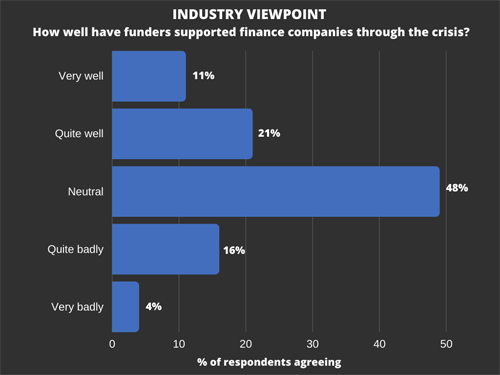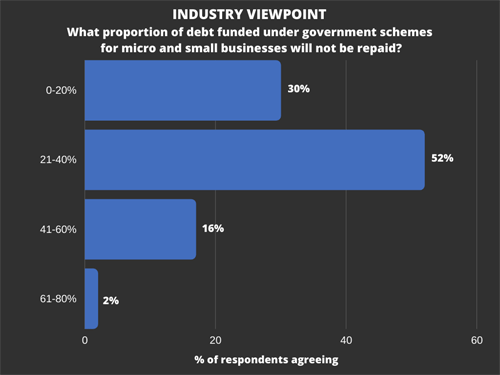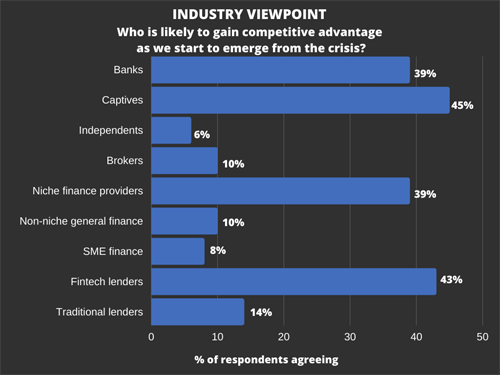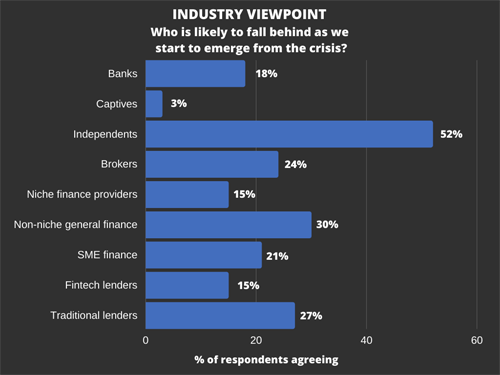
In the latest of a series of online conferences run by the International Asset Finance Network (IAFN) delegates were informed of a range of topics surrounding auto and equipment finance liquidity.
Speakers at the event included a range of senior professionals with a wealth of industry experience, including:
- Peter Cottle, head of automotive sector at Growcap;
- Mike Randall, chief executive officer at Simply;
- Steve Swift, managing director at Kennet Equipment Leasing;
- Gavin Wraith-Carter, managing director at Hitachi Capital Business Finance;
- David Betteley, content advisor at Asset Finance International;
- Edward Peck, co-founder of IAFN; and,
- Brian Rogerson, co-founder of IAFN.
Prior to the event, IAFN had received comments from a lender in the industry who explained his frustration at the “woeful incompetence” of the funders for finance companies and regulators. He said: “I find the FCA’s focus on treating customers fairly is missing the point if we cannot access assistance ourselves to help the rising arrears situation. The FCA appears to be completely incompetent and out-of-touch, and seems to treat us like a kicking ball. I don’t think we have had a single reply to any of our correspondence.
“As far as the clearing banks are concerned, there I will hold my council, as getting them to understand our business in the first place is the devil’s own job. Our accountant has advised us to apply for a CBILS loan and we await a response. Having spoken to other finance companies like ourselves, they are in a similar position. The block funders have a rude-awakening coming to them which they seem incapable of handling in a positive manner.”
Funding for finance companies
Detailing how independent finance companies are being treated by funders and what it could mean for the appetite for lending in future, the speakers gave delegates crucial insights into the industry. Mike Randall, chief executive officer of Simply, said: “We’ve seen a range of behaviours ranging from really good support to some really poor behaviour. I think it’s fair to say that across the board, the independent lenders have not received the support that we would have expected - bearing in mind that we filled the void from the last financial crisis. Ultimately, the loser in this is the SME, because they will see a shrinking of availability of funding after this.”
Steve Swift, managing director at Kennet Equipment Leasing, added: “I think the ability for independent finance companies to lend to SMEs in the future is dramatically reduced. However, here at Star and Kennet we’re already seeing a rise in demand from our customers but we have to be very careful with liquidity.”
Putting the question to the audience, the results showed that some 49.1% of the 59 respondents thought the funders had neither been good or bad in their support of finance companies throughout the crisis. However, with a total of 31.6% suggesting that the funders had done ‘quite well’ or ‘very well’, and only 18.3% opting for ‘quite badly’ or ‘very badly’, it’s clear that the audience thought the funders had coped relatively well with the high demand.

The second question put to audience members focused around the government-implemented funding schemes for SMEs, and what percentage of them would not be repaid. Some 51.9% of the 54 respondents came back with the gloomy prospect that around 21-40% of the debt funded under government schemes that SMEs had incurred would not be repaid. A further 29.6% of respondents suggested that 0-20% would not be repaid.

The winners and losers
The final two questions posed to delegates asked for their opinion on who they thought would come out on top, and who they thought would struggle greatly following the pandemic. The choices offered to delegates were split into three categories with two-four options in each category.
On the topic of who would gain a competitive advantage from the crisis, David Betteley, content advisor at Asset Finance International, said: “The captives are very dominant in the used car market through their franchised dealers, they would typically take around 80% of the used car volume and they do that through approved and certified used vehicle programs. So, they will very definitely continue because they’re very important for the OEMs and they’re very important for the dealers. There will be a lot of opportunities for the independents though, particularly with the used car supermarkets and the dealer groups who have multi-brand, standalone used car sites. But, the captives – working with the OEMs – will still continue to take the lion’s share of used cars that are sold by the franchised dealers.”
As seen below, there was a wide range of responses, with captive finance companies chosen by 44.9% as the type of organisation that would gain a competitive advantage in the first category, niche finance providers at 38.8% in the second category and fintech lenders at 42.9% in the last category. A total of 82 delegates responded to the last two poll questions, 49 for the first and 33 for the second.
In regards to who will fall behind as we begin to emerge from the pandemic, 51.5% of the respondents selected independent finance companies from the first category, 30.3% chose non-niche finance providers from the second category, and 27.3% selected traditional lenders from the last category.







